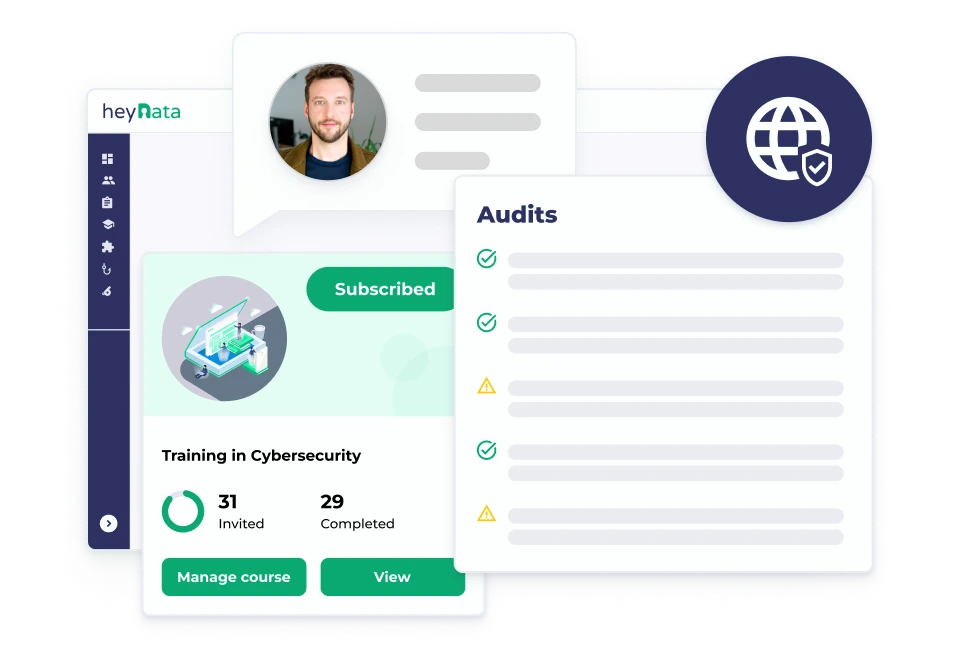Table of contents

What is a Record of Processing Activities?
A central and detailed document according to Article 30 of the GDPR that lists all activities in which personal data is processed. It serves as an essential basis for compliance with data protection regulations and creates transparency regarding a company's data processing.
Who Needs a Record of Processing Activities?
If a company collects, stores, modifies, passes on or otherwise uses personal data, it must, in most cases, keep a record of these processing operations in accordance with Art. 30 GDPR. Only in a few exceptional cases, according to Art. 30 (5) GDPR, is this not necessary.
Companies with fewer than 250 employees, for example, are only exempt from this regulation if:
- The processing of the data does not pose a risk to the privacy and rights of the data subjects.
- The data processing only takes place occasionally.
- There is no processing of special categories of data in accordance with Art. 9 (1) GDPR and Art. 10 GDPR.
For companies with more than 250 employees, keeping a processing directory is generally mandatory. This regulation emphasizes the importance of data protection in larger companies, where there is a greater likelihood of a larger amount of data and more complex data processing systems. It is essential that these companies strictly adhere to the GDPR regulations to avoid heavy penalties and to maintain the trust of their customers and partners.
Nevertheless, the complicated nature of the GDPR regulations means that it is advisable for companies of all sizes to have a record of this kind. The record shows that the company complies with data protection and provides a clear overview of all data processing activities within the company.
Checklist: How to Create a Record of Processing Activities
Controller and Data Protection Officer
Define who processes the data, including contact information and, if applicable, representatives.
Purposes of Processing
List the legitimate grounds and purposes for processing the data.
Data Categories
List the types of personal data that are processed (e.g. name, address, date of birth).
Affected Groups
Identify which groups are affected (e.g. customers, employees).
Data Recipient
Document who has access to the data (e.g. service providers, authorities).
Deletion Periods
Define clear deadlines for the deletion of data.
Transfer of Data to Third Countries
Describe transfers outside the EU/EEA and the safeguards applied.
Protective Measures
Explain how the data is secured (e.g. encryption, access restrictions).
Special Data Categories
Notes particularly sensitive data or automated decision-making (e.g. political beliefs, health).
Hear it From Our Customers

The Record of Processing Activities and the Data Protection Officer
An internal or external data protection officer will help you to analyze processes and efficiently create the directory. Expert advice will help you to optimally implement data protection requirements.
Discover the Benefits of an External Data Protection Officer Now!
Free consultation!Why Choose heyData for your Record of Processing Activities
1
Intuitive Management
Digital and legally secure creation and updating of your ROPA.
2
Comprehensive Overview
All data processing steps at a glance.
3
Expert Guidance
Access to experienced data protection lawyers for personalized support.
4
Legal Security
Ensure GDPR compliance without effort.
Advantages of a Digital Record of Processing Activities
Traditional Method
Digital Solution (heyData)
Processing time
Time-consuming, manual updates
Automatic updates in a few clicks
Error rate
High error rate due to manual entry
Error reduction through automated processes
GDPR Compliance
Difficult to verify
Real-time GDPR compliance score
Accessibility
Local storage, limited availability
Cloud-based, accessible from anywhere at any time
Team collaboration
Difficult integration of team members
Collaborative platform with access rights
FAQ
Creating a record of processing activities as early as possible is recommended, ideally when you start your business. This way, you can ensure compliance with the GDPR from the start and significantly reduce the risk of data breaches.
A register of processing activities offers a number of key benefits. It helps minimise data breaches, which prevents potential financial penalties and reputational damage. It also fosters trust with your customers and partners, which promotes long-term relationships and a positive corporate reputation. It also provides clear internal documentation, which is beneficial for data protection audits and cooperation with data protection authorities.
The complexity depends on the size and scope of the company. For small and medium-sized companies it can be manageable, while larger companies have to put in more effort. For these reasons, our clients very often turn to us when they need fast and effective support so that they do not have to spend weeks creating these documents.
Yes, the register of processing activities should be updated regularly. As business processes can change and new data protection requirements emerge, it is important to keep the record up to date. Regular review and updating ensures that data protection risks continue to be appropriately assessed and managed.





